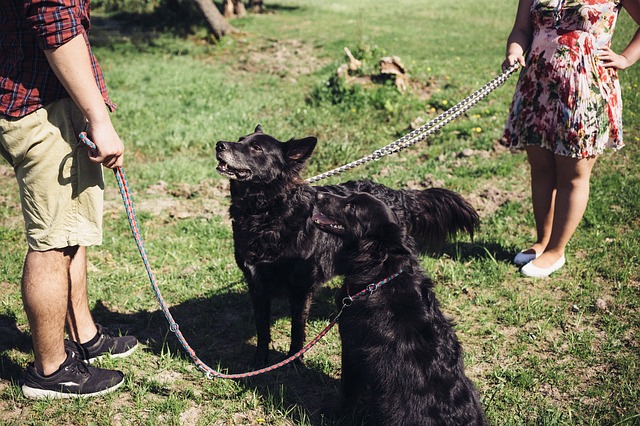When you’re happily in a relationship and facing the exciting milestone of adding a dog to the family, it’s hard to plan for the depressing “what if”: If you and your partner splits up, who gets the dog?
But sadly, it’s a common reason for nasty pet custody battles, the same pets that were welcomed with open arms into a couple’s life while they were still happy. At best, the pooch gets to live with the human who can provide the most adequate care, but at worst, their world gets turned upside down and they’re brought to a shelter. But when both humans are battling it out trying to keep the dog, how do they reach a resolution?

When it comes to divorce, things can get especially sticky. According to an article by HuffPost, dogs are considered “property” in all states except Alaska and Illinois (in which a judge can award full or joint custody, like with children). In the article, Molly Rosenblum, a Las Vegas family law attorney, explained:
“Our judges don’t care, and the law tells them they can’t care.”
Oftentimes, the solution is to sell the dog and split the profit, as if pawning off a piece of antique furniture. In cases like this, couples are really forced to figure something out, unless they both want to lose the pup forever. HuffPost outlines one particular incident:
In one case, [Rosenblum] told HuffPost, an exasperated judge ordered the court marshal to take the dog in question to a nearby park and see which parent the pooch ran to. The divorcing humans were warned to not call the dog’s name or stuff their pockets with liver treats ― kind of like tampering with evidence or bribing a witness.
The winning parent was the wife. Her soon-to-be ex-husband got $500 in lieu of custody, and, at least in this case, his howls of protest went unanswered.
There’s really no simple answer to this tough scenario, and the best thing to do is to plan ahead. Married couples should specify custody arrangements in pre-nuptial agreements, or at least be willing to come to a custody agreement if things go awry.

But couples who get a pooch together and aren’t married are really treading in unchartered territory. Without the formality of divorce proceedings to split assets, what should they do?
A story by BarkPost outlines a list of considerations for dating couples when they’re faced with the question, “who gets the dog?”
Assuming that both parties truly want what’s best for the pup, they need to consider who’d be best to provide for, and have time for, the pet. And, in the interest of the four-legged family member, it’s important to remain civil, especially if joint custody is arranged. If your partner is being uncooperative, it might be time to talk to a lawyer. In the case of the BarkPost author, she and her ex each decided to keep one of their two dogs.
While it may seem natural to split up animals in multi-pet households, there come even more questions: who gets which pets, and will it be more detrimental to separate them than to keep them together? There’s no right or wrong answer; it really depends on every individual situation.
Other things to consider with deciding pet custody:
- Who will be able to keep the dog’s routine as normal as usual? (If one person is moving out, consider whether it’s best for Fido to stay “home.”)
- Is one of you more likely to take him to the same vet / groomer / dog park, etc. to keep his life as stable as possible?
- Who’s most likely to be able to afford surprise vet bills? Or…
- Are you and your ex willing to share costs?
- Is the dog okay traveling frequently if you decide to share custody?
- Who has more time to spend with the pooch?
- Who’s willing / able to provide adequate exercise?

In the midst of the stress, pain, and hurt of a breakup, it can be hard to step back and really decide what’s best for the dog — not for each person. If both people can put their dog’s interests first, they should come to some sort of agreement. After all, our pets are the innocent ones in this scenario who don’t have a choice.
Getting a dog with the person you love is exciting, but if you really want what’s best for everyone, work out a “what if” plan — and put it in writing — before bringing a new pet home.
Have you ever been in this difficult situation? What was the solution?
 Toledo, United States.
Toledo, United States.